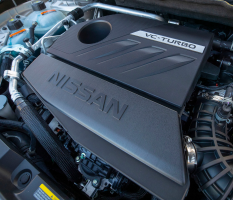
— Nissan Rogue gas odors are allegedly caused by faulty direct injection gasoline engines suffering from oil dilution and other issues.
A class-action lawsuit alleges that 2021-2023 Nissan Rogues smelled of gas in the cabins and outside of the SUVs.
And the lawsuit also alleges that owners claim the smell of gas can be strong and overpowering, even when the Rogues are parked.
The lawsuit alleges that Nissan is aware of the gas odor problems but has not issued a recall to repair the vehicles. And according to the class action, engine oil contaminates fuel and causes premature wear and failure of Nissan Rogue engines.
Additionally, the lawsuit alleges that the engine bearings fail because the Rogue’s engine oil loses its original viscosity, leaving the bearings and other engine parts unprotected.
“This can cause contact between metal surfaces inside the engine, causing rapid wear of the internal bearings, rotating assembly and other internal parts that rely on lubrication to function properly.” — Nissan Rogue Gas Odor Lawsuit
Nissan is allegedly hiding engine problems that will cause Rogue owners to pay big bucks for repairs. Without a recall for all 2021-2023 Rogues, owners and lessees are allegedly stuck because dealers refuse to repair or don’t know how to properly repair direct-injection gasoline engines.
New Jersey plaintiff Scott Young purchased a new 2022 Nissan Rogue, but claims he began experiencing strong fuel odors from the Rogue just months after purchasing the vehicle. Plaintiff states that the smell of gas is very strong even when he parks the Rogue in his driveway.
“Plaintiff has his vehicle serviced approximately every 5,000 miles and the dealer has not found the source of the fuel odor during any of these services.” — Nissan Rogue Class Action Lawsuit
According to demand, 2021-2023 Nissan Rogues are equipped with 1.5-liter KR15DDT and 2.5-liter PR25DD engines equipped with positive crankshaft ventilation (PCV) systems that do not prevent fuel contamination in the crankcases.
The PCV system is allegedly inadequate, allowing unburnt fuel to build up within the engine’s oil system. The Rogue engine allegedly suffers from contact between connecting rods and connecting rod bearings, and between the crankshaft and main bearings.
In addition to refusing to issue a Nissan Rogue engine recall, the plaintiff claims that dealers cannot repair the vehicles even when the Rogues are under warranty.
The class action says Nissan is telling Rogue owners to ignore the gas smell and continue driving the vehicles and perhaps roll down the windows or adjust the heating and cooling settings.
The Nissan Rogue gas odor lawsuit was filed in the U.S. District Court for the Middle District of Tennessee: Scott Young v. Nissan North America, Inc.
The plaintiff is represented by Stranch, Jennings & Garvey, PLLC and Sauder Schelkopf.


